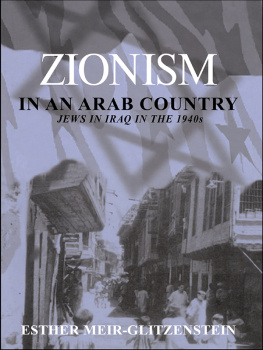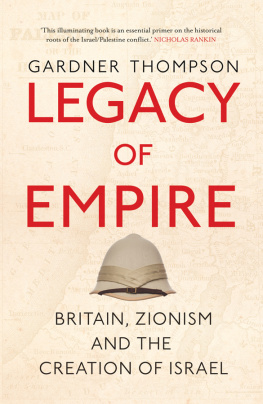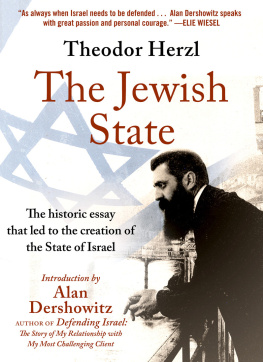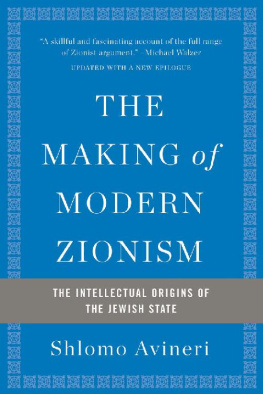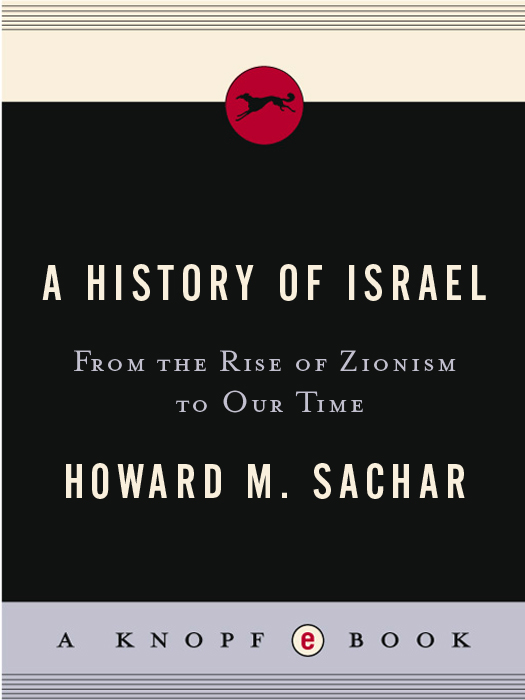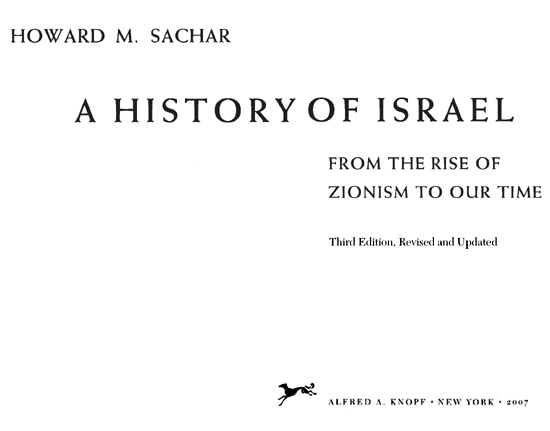Also byHOWARD M. SACHAR
THE COURSE OF MODERN JEWISH HISTORY
ALIYAH: THE PEOPLES OF ISRAEL
FROM THE ENDS OF THE EARTH: THE PEOPLES OF ISRAEL
THE EMERGENCE OF THE MIDDLE EAST, 19141924
EUROPE LEAVES THE MIDDLE EAST, 19361954
THE MAN ON THE CAMEL
EGYPT AND ISRAEL
DIASPORA: AN INQUIRY INTO THE CONTEMPORARY JEWISH WORLD
A HISTORY OF ISRAEL: FROM THE AFTERMATH OF THE YOM KIPPUR WAR
A HISTORY OF THE JEWS IN AMERICA
FAREWELL ESPAA: THE WORLD OF THE SEPHARDIM REMEMRERED
ISRAEL AND EUROPE: AN APPRAISAL IN HISTORY
DREAMLAND: EUROPEANS AND JEWS IN THE AFTERMATH OF THE GREAT WAR
A HISTORY OF THE JEWS IN THE MODERN WORLD
THIS IS A BORZOI BOOK
PUBLISHED BY ALFRED A. KNOPF, INC .
Copyright 1976, 1996, 2007 by Howard M. Sachar
Maps for original edition copyright 1976 by Jean Paul Tremblay
Maps for second edition copyright 1996 by George Colbert
All rights reserved.
Published in the United States by Alfred A. Knopf, a division of Random House, Inc., New York, and in Canada by Random House of Canada Limited, Toronto.
Library of Congress Cataloging-in-Publication Data
Sachar, Howard Morley, [date]
A history of Israel : from the rise of Zionism to our time / by Howard M. Sachar. 3rd ed., rev. and updated.
p. cm.
This is a Borzoi bookT.p. verso.
Includes bibliographical references.
eISBN: 978-0-8041-5049-1
1. IsraelHistory. 2. ZionismHistory. 3. PalestineHistory19171948. I. Title.
DS126.5.S155 2007
956.94dc22 2006101970
v3.1_r1
For Daniel
CONTENTS
MAPS
| Jewish Settlement (Yishuv) in Palestine, 18811914 |
| The Sykes-Picot Agreement of 1916 for the Partition of the Middle East |
| The Palestine Battleground |
| Palestine under the British Mandate, 19231948 |
| The Growth of the Jewish National Home before 1939 |
| The Royal Commission (Peel) Plan for Partition of Palestine, 1937 |
| The United Nations Plan for Partition of Palestine, November 29, 1947 |
| The Initial Arab Invasion of Palestine, May 15June 11, 1948 |
| The Last Jewish Campaign of the Palestine War, December 22, 1948January 8, 1949 |
| The Rhodes Armistice Demarcation Line |
| Partitioned Jerusalem, 19481967 |
| Israel-Syria Demilitarized Zones |
| The Sinai Campaign, October 29-November 5, 1956 |
| Integrated National Water Distribution System |
| Israels Southern Hinterland |
| The Conquest of Sinai, June 58, 1967 |
| The Capture of the West Bank, June 57, 1967 |
| The Capture of Jerusalem, June 57, 1967 |
| The Conquest of the Golan Heights, June 910, 1967 |
| Greater Israel (after June 10, 1967) |
| The Golan Heights under Israeli Occupation |
| The West Bank under Israeli Occupation |
| The Syrian Offensive, October 610, 1973 |
| The Egyptian Offensive, October 612, 1973 |
| Israeli Counterattack on Northern Front until Cease-fires of October 2224, 1973 |
| Israeli Counterattack on Southern Front until Cease-fires of October 2224, 1973 |
| Israeli-Egyptian Separation-of-Forces Agreement, January 18, 1974 |
| Israeli-Syrian Separation-of-Forces Agreement, May 31, 1974 |
| Israeli-Egyptian Separation-of-Forces Agreement, September 4, 1975 |
| Israeli-Egyptian Peace Treaty, March 26, 1979 |
| Begins Master Plan for the West Bank, 1981 |
| Greater Jerusalem under Israeli Administration, 19671986 |
| West Bank Settlements in the Likud Era, 19771984 |
| Lebanon: Operation Peace for the Galilee, June 611, 1982 |
| Israeli-Palestinian Agreements, 19931999 |
| West Bank Populations (2004) |
| The Israeli-Hizballah Battlefield, 2006 |
STYLISTIC NOTE
In transliterated Hebrew words appearing in the text and bibliography, the consonant ch is pronounced from the back of the palate, rather than as in the English word chain. Similarly, the consonant z in transliterated words as a rule is pronounced tz, as in Eretz Israel, kibbutz, and kvutzah (three common transliterations where the tz is left intact). While Arabic words listed in the bibliography follow the classical formalthough without diacritical markingstransliterations more familiar to Westerners also are used in the text.
PREFACE
This is a long volume for a small country. After four far-ramifying Middle Eastern crises in one generation, however, it may be assumed that the seismic impact of Israel upon the contemporary world is too palpable to require elaboration. One may even argue that the Jews, with or without statehood, have exerted an uncommonly protean influence upon organized society from ancient to modern times. Ironically, the theorists of Zionism had anticipated that revived nationhood in the Land of Israel finally would lift this unique and burdensome afflatus from the backs of the Jewish people; for, aside from the religionists among them, the Zionists were animated less by a sense of mission than by a search for normalcy. In the ensuing chapters, we shall have opportunity to evaluate the ambivalent results of that quest.
Although this work is intended in large part for university students and general readers, I venture to hope that specialists in modern history may find useful certain extended treatments that relate to the Middle East as a whole. (To that end, I have not hesitatedparticularly in Chapters to borrow material appearing in my own specialized works in this field, The Emergence of the Middle East and Europe Leaves the Middle East.) The bibliography, too, has been organized with concern for those who may wish to probe more thoroughly into selected topics of their own research. It should be noted here that the selections are less formidable than they may initially appear. While the list plainly is more than introductory, it is far from exhaustive. An endless source of fascination for social scientists, the Jewish nation has evoked and produced an immense literature, one as out of proportion to its size as the role of Israel altogether in the twentieth century.
The book owes much to the help of several good friends and respected colleagues. The Faculty Research Committee of George Washington University under the chairmanship of Dean Henry Solomon generously underwrote the expenses attendant upon the completion of this manuscript. Professor Joseph Nedava, chairman of the political science department of the University of Haifa, graciously read and offered corrections for many of the prestate chapters. Mr. S. Z. Abramov, Knesset Member and distinguished historian, provided invaluable marginal commentary on the chapters dealing with Israels political and ideological evolution. Mr. David Kochav, presently economic adviser to the Israeli ministry of defense, supplied many incisive observations for the chapters on Israels economic life; while Mr. Moshe Raviv, director of the United States department of the Israeli foreign ministry, made numerous crucial suggestions for the chapters describing Israels international relations. In the same spirit, Professor Jacob Neusner of Brown University contributed his insights into the question of links between Israel and the Diaspora.


